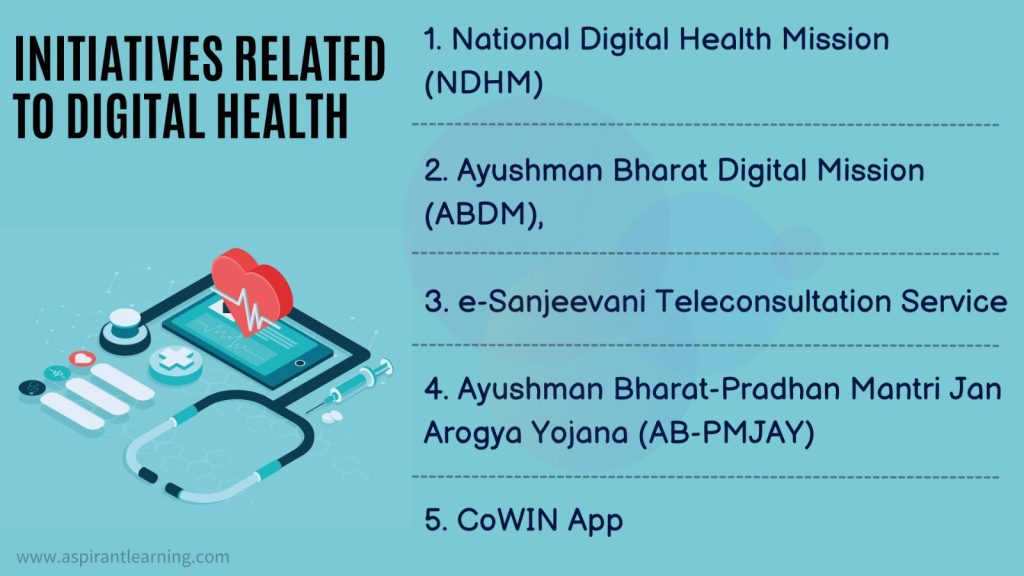News Highlights:
- Recently, the Confederate of Indian Industry (CII) co-organised Digital Health Summit 2023 with the Union Ministry of Health & Family Welfare.
- CII is a non-government, not-for-profit, industry-led and industry-managed organisation.
Digital Health Summit 2023:
- Highlights:
- It highlighted the importance of digital health innovations and how they can empower exponential medicine, including 3D printing, point-of-care diagnostics, robots, bioinformatics, and genomics.
- It aims to create a digital public goods framework to promote interoperability, data privacy, and data security standards.
- It emphasised the need for “citizen-centric” digital health systems with equitable access to high-quality treatments.
- It also highlighted that health tech is the most significant aspect of the Fourth Industrial Revolution, and taking pre-emptive steps remains the key.
- Theme:
- The theme of the event was ‘Building One Health Together – Improving Health Equity’, with the objective of bringing together policymakers, industry leaders, and global healthcare experts and thought leaders to deliberate upon key issues confronting the digital health space.
Digital Healthcare:
- About:
- Digital healthcare is a medical care delivery system that uses various digital technologies to make quality medical care services accessible, affordable, and sustainable.
- The broad scope of digital health includes mobile health (mHealth), health information technology (IT), wearable devices, telehealth and telemedicine, and personalised medicine.
- The WHO Global Strategy on Digital Health, adopted in 2020 by the World Health Assembly, presents a roadmap to link the latest developments in innovation and digital health and implement these tools to improve health outcomes.
- Benefits:
- Telemedicine has played a pivotal role in decentralising healthcare and ensuring access to remote and advanced care.
- Patients in rural and remote areas can now access affordable and quality healthcare through online consultation and home delivery of medicines.
- Digital tools can provide healthcare providers with an extensive view of patient health by increasing access to health data.
Applications of Digital Healthcare:
- Point-of-Care Diagnostics:
- Point-of-care Diagnostics (“POCD”) is an emerging trend in the medical device industry and encompasses a broad range of products which enables accurate diagnostics in a resource-limited setting by patients themselves or healthcare practitioners.
- In the recent past multiple applications such as biosensors, portable x-rays, handheld ultrasounds, and smartphone-based POCD have been developed.
- Medical Virtual Assistants:
- Virtual health assistants and chatbots bridge the gap between patients and physicians and tend to the needs of the patients in between physical appointments through services such as appointment scheduling, maintaining health records and other administrative tasks.
- Self-Monitoring Healthcare Devices:
- Monitors and sensors are now being integrated into wearables, which allow them to detect various physiological changes in the body.
- These smart devices can track weight, sleep patterns, posture, diet and exercise.
- e-Pharmacies:
- An e-pharmacy is a pharmacy that operates over the Internet and fulfils orders through mail, courier or delivery persons.

What are the challenges in digital health?
- IT and AI system failures:
- AI and Information technology are considered the backbone of digital health.
- The data generated in digital health systems are deliberately utilised by AI for improved diagnosis, selecting the right treatments and predicting clinical outcomes.
- The well-established and innovative implementation of such technologies enables viable uptake of digital health.
- It is imperative to carefully analyse the bottlenecks of AI and IT systems failure that intensify safety, sustainability and fairness challenges.
- Ethical challenges:
- Data is a critical enabler of digital health practices.
- Lack of security measures can lead to data breaches and compromise patient data.
- For example, a recent ransomware attack occurred at AIIMS Delhi.
- Absence of Clear Regulation:
- The absence of clear regulations and guidelines may lead to fraudulent practices, misuse of digital prescriptions, data theft, and misuse of electronic health records.
- Also, the lack of digital infrastructure and skilled professionals is another roadblock to the digitalisation of the healthcare system in India.
Pic Courtesy: Freepik
Content Source: PIB



